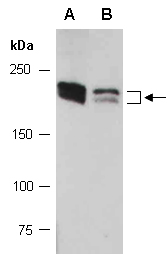Abiocode Logo
Products
Contact Us
- Telephone:
1-818-707-0309 - E-Mail:
Abiocode@Abiocode.com
R1694-2 - PIK3C2A (C) Antibody, Rabbit Polyclonal
|
Quantity: 100 ul Application: WB Predicted I Observed M.W.: 191 kDa Uniprot ID: O00443 Background: PIK3C2A belongs to the phosphoinositide 3-kinase (PI3K) family. PI3-kinases play important roles in signaling pathways involved in cell proliferation, oncogenic transformation, cell survival, cell migration, and intracellular protein trafficking. PIK3C2A contains a lipid kinase catalytic domain as well as a C-terminal C2 domain, a characteristic of class II PI3-kinases. C2 domains act as calcium-dependent phospholipid binding motifs that mediate translocation of proteins to membranes, and may also mediate protein-protein interactions. The PI3-kinase activity of this protein is not sensitive to nanomolar levels of the inhibitor wortmanin. It has been shown that PIK3C2A can be activated by insulin and may be involved in integrin-dependent signaling [provided by RefSeq]. Other Names: Phosphatidylinositol 4-phosphate 3-kinase C2 domain-containing subunit alpha, PI3K-C2-alpha, PtdIns-3-kinase C2 subunit alpha, Phosphoinositide 3-kinase-C2-alpha Source and Purity: Rabbit polyclonal antibodies were produced by immunizing animals with a GST-fusion protein containing the C-terminal region of human PIK3C2A. Antibodies were purified by affinity purification using immunogen. Storage Buffer and Condition: Supplied in 1 x PBS (pH 7.4), 100 ug/ml BSA, 40% Glycerol, 0.01% NaN3. Store at -20 °C. Stable for 6 months from date of receipt. Species Specificity: Human, Mouse Tested Applications: WB: 1:1,000-1:3,000 (detect endogenous protein*) *: The apparent protein size on WB may be different from the calculated M.W. due to modifications. Product Data:
A) mouse thymus, B) human Jurkat; using anti-PIK3C2A (C) (R1694-2) at RT for 2 h. |
